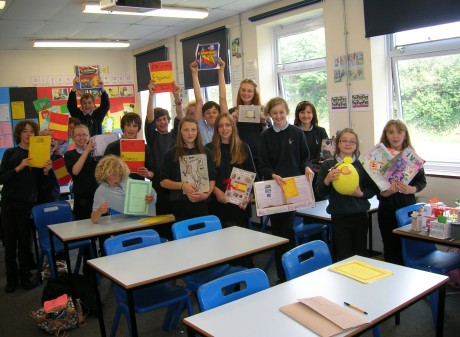Modern Languages
“One language sets you in a corridor for life. Two languages open every door along the way.”
– Frank Smith

At Mullion School we believe that Languages open doors. Knowing another language opens doors for all our pupils professionally, personally and socially. Learning another language contributes to mutual understanding, a sense of global citizenship and personal fulfilment. As our pupils learn about different languages, they also learn about different countries, cultures, communities and people and, by comparing these to their own experiences, they gain further insight into their own culture and community. We believe that learning about a language and where it is spoken allows all our pupils to travel the world, even if we don’t leave our classroom in Mullion.
Our Languages department uses a range of strategies to ensure that pupils learn in an enjoyable, positive and inclusive environment. Our approach leads us to teach new language in chunks, rather than single words, following the EPI (Extensive Processing Instruction) method. By breaking the language into chunks it is easier for pupils to assimilate the language and reduces cognitive load. This makes lessons more accessible and enjoyable for all. When pupils are with us, they feel safe enough to “take the risk” of speaking in a foreign language, which can seem daunting at first. By participating in Languages lessons, pupils learn to develop their resilience and we love to see each pupil “give it a go” and try their best in class.
In Key Stage 3, our curriculum lays the foundation of Language learning. Pupils build their phonological awareness (how the Language sounds) and are introduced to key grammatical ideas, in order to communicate. Our curriculum is designed with Communicative Functions in mind; this means that the language and structures we teach allow the pupils to meet a purpose, whether that is describing a person or place, expressing one’s thoughts and feelings, formulating and supporting opinions or describing an event in the past. By being able to express themselves effectively, this helps to make the subject relevant for the pupils both in school, and the wider world when they leave our care.
In Key Stage 4 our pupils continue on their Language learning journey and are free to choose either French or Spanish (or both) to study for GCSE.
|
YEAR 7 |
In year 7 all pupils study French, which introduces them to the fundamentals of another language and helps cement the skills of forming longer sentences and paragraphs; manipulating language; noticing patterns and comparing a different language to their own. Pupils are introduced to key grammatical concepts and get to grips with new skills, such as conjugating verbs and adjectival agreements. We focus on communication and there are ample opportunities for pair work and collaboration to practise their language skills. They will learn these skills through: introducing themselves and describing themselves, family members and friends; talking about their home and local area.
There are many opportunities for independent learning throughout their language learning journey, starting in year 7 with the use of The Language Gym and memrise.com to help pupils boost their confidence. |
|
YEAR 8 |
In year 8, all pupils continue with French and build on the skills they have learned, as well as adding in new skills, such as, using a different tense. We continue to use a variety of exciting activities and games to engage and encourage pupils in their lessons. In year 8 French, pupils cover the following topics: talking about sports and leisure activities; talking about the weather; talking about what clothes you wear; talking about school; talking about your daily routines.
Most pupils start to study Spanish in year 8 in addition to French, which allows them to build their academic progress, as well as their cultural appreciation and understanding of other societies. Pupils will do this through the following topic areas: introducing yourself; talking about school; talking about family; describing where you live. |
|
YEAR 9 |
In year 9 pupils continue on their language pathway and build their resilience as we tackle more complex linguistic structures, for instance, progressing to using multiple tenses in pieces of writing.
In French pupils will study the following topics: talking about holidays in the past, present and future; talking about food and cuisine. In Spanish pupils will study the following topics: freetime and leisure activities; talking about your town/local area; talking about food; clothes and shopping.
|
| YEAR 10 | In year 10, pupils in Spanish and French start an engaging course of study that will enable them to manipulate and use the language effectively, independently and creatively, so that they have a solid basis from which to progress to A Level or employment. The course and assessments allow for spontaneity and test grammar, as well as providing plenty of opportunities for students to apply their knowledge independently, creatively, and in authentic situations.
In Spanish pupils develop their key skills through the following topics: Holidays; School; Self, family and friends; Sports and leisure activities; Local area. In French pupils study: Self, family and friends; Sports and leisure activities; Celebrations and customs; Local area; Holidays. |
| YEAR 11 | In year 11 pupils continue with their GCSE course and start honing their linguistic knowledge so they are ready to progress to further study or employment.
In Spanish we study the following topics: Celebrations and customs; Jobs and future plans; Environment and global issues. In French we study the following topics: School; Jobs and future plans; Environment and global issues. |
Scheme of Assessment
| Autumn Term | Spring Term | Summer Term |
| Year 7
French: Regular low-stakes vocab tests and quizzes in class. End of unit test, covering 2 of the 4 skills. |
Year 7
French: Regular low-stakes vocab tests and quizzes in class. End of unit test, covering 2 of the 4 skills. |
Year 7
French: Regular low-stakes vocab tests and quizzes in class. End of unit test, covering 2 of the 4 skills. |
| Year 8
French: Regular low-stakes vocab tests and quizzes in class. End of unit test, covering 2 of the 4 skills. Spanish: End of unit tests, covering 2 out of the 4 skills. |
Year 8
French: Regular low-stakes vocab tests and quizzes in class. End of unit test, covering 2 of the 4 skills. Spanish: End of unit tests, covering 2 out of the 4 skills. |
Year 8
French: Regular low-stakes vocab tests and quizzes in class. End of unit test, covering 2 of the 4 skills. Spanish: completion of the Spanish project, as classwork and homework. |
| Year 9
French: Regular low-stakes vocab tests and quizzes in class. End of unit test, covering 2 of the 4 skills. Spanish: Regular low-stakes vocab tests and quizzes in class. End of unit test, covering 2 of the 4 skills. |
Year 9
French: Regular low-stakes vocab tests and quizzes in class. End of unit test, covering 2 of the 4 skills. Spanish: Regular low-stakes vocab tests and quizzes in class. End of unit test, covering 2 of the 4 skills. |
Year 9
French: Regular low-stakes vocab tests and quizzes in class. End of unit test, covering 2 of the 4 skills. Spanish: Regular low-stakes vocab tests and quizzes in class. End of unit test, covering 2 of the 4 skills. |
| Year 10
French: Listening and Reading paper Spanish: Listening and Reading paper Regular low-stakes vocab tests and quizzes in class. |
Year 10
French: Listening and Reading paper Spanish: Listening and Reading paper Regular low-stakes vocab tests and quizzes in class. |
Year 10
French: Listening and Reading paper Speaking assessment Spanish: Listening and Reading paper Speaking assessment Regular low-stakes vocab tests and quizzes in class. |
| Year 11
French: Listening and Reading paper Spanish:Listening and Reading paper Regular low-stakes vocab tests and quizzes in class. |
Year 11
French: Listening, Reading, Writing Mock exams Mock Speaking exam Spanish: Listening, Reading, Writing Mock exams Mock Speaking exam Regular low-stakes vocab tests and quizzes in class. |
Year 11
French: GCSE Listening, Reading, Writing and Speaking exams Spanish: GCSE Listening, Reading, Writing and Speaking exams |
MFL Feedback Policy
In the MFL department we believe that feedback and marking are an important part of a pupil’s learning journey. In our department feedback takes many forms and focuses on developing all four key skills – Listening, Reading, Speaking and Writing.
As stated in the Whole School Feedback policy, we believe that feedback should impact on learning, be useful and further a pupil’s progress, as well as celebrate what they can do. Feedback in the MFL department will be regular and timely and detailed feedback will be provided approximately three times a term.
Written feedback
Written feedback takes place when relevant in the learning cycle. This consists of praise; a WWW (What Went Well) comment and something to improve; an EBI (Even Better If) target.
Pupils will respond to written feedback in purple pen. Time is planned into lessons for pupils to correct and improve aspects of their learning, as advised by their teacher in their written feedback.
When assessed written tasks are set, pupils will be given clear instructions with success criteria; these will be referenced when the task is marked.
Codes will be used when marking written work, for clarity and ease; some common examples are listed below.
Immediate feedback
Immediate feedback is seen regularly in MFL lessons.
Pupils self and peer mark a range of tasks, including listening, reading and writing tasks, under the guidance of the teacher, which allows pupils to have instant feedback on their understanding.
Teachers regularly provide verbal feedback in class and pupils are encouraged to record this when necessary.
Teachers regularly provide instant feedback on pupils’ speaking skills and pronunciation and pupils are given opportunities to correct and improve their spoken language.
Sample Literacy codes used in marking:
Sp = spelling
WW = wrong word
WO = word order
^ = missing word
A = agreement
T = tense
P = punctuation

